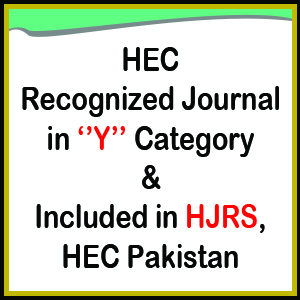The Impact of Workplace Ostracism on Job Performance with the Mediating Role of Emotional Exhaustion: Evidence from Public Sector Universities of Pakistan
DOI:
https://doi.org/10.47067/reads.v6i3.253Keywords:
Workplace Ostracism, Emotional Exhaustion, Job PerformanceAbstract
This study was conducted with an intention to investigate the influence of workplace ostracism on job performance with mediating effect of emotional exhaustion in higher educational institutions. Data was collected using a quantitative technique through questionnaire form a sample of 317 workers serving at state universities located in twin cities of Islamabad/ Rawalpindi. Simple random sampling technique was adopted. Data was analyzed through SPSS and AMOS software. Results of the study shown that workplace ostracism is significantly associated with job performance. The present study also revealed the mediating effect of emotional exhaustion in the relationship between workplace ostracism and job performance.
References
Banki, S. (2014). How much or how many? partial ostracism and its consequences. Dissertation Abstracts International Section A: Humanities and Social Sciences, 74, No-Specified.
Bedi, A. (2019). No Herd for Black Sheep: A Meta-Analytic Review of the Predictors and Outcomes of Workplace Ostracism. Applied Psychology.
Chung, Y. W. (2017). The role of person-organization fit and perceived organizational support in the relationship between workplace ostracism and behavioral outcomes. Australian Journal of Management, 42(2), 328–349.
Chung, Y. W. (2018). Workplace ostracism And workplace behaviors: A moderated mediation model of perceived stress and psychological empowerment. Anxiety, Stress, and Coping, 31(3), 304–317.
Cole, M. S., & Bedeian, A. G. (2007). Leadership consensus as a cross-level contextual moderator of the emotional exhaustion-work commitment relationship. Leadership Quarterly, 18(5), 447–462.
Cropanzano, R., Rupp, D. E., & Byrne, Z. S. (2003). The relationship of emotional exhaustion to work attitudes, job performance, and organizational citizenship behaviors. Journal of Applied Psychology, 88(1), 160–169.
Fatima, T., Bilal, A. R., & Imran, M. K. (2019). Workplace ostracism and employee reactions among university teachers in Pakistan. Qualitative Report, 24(11), 2759–2777.
Feng, L., Li, J., Feng, T., & Jiang, W. (2019). Workplace ostracism and job performance: Meaning at work and family support as moderators. Social Behavior and Personality, 47(11). https://doi.org/10.2224/sbp.8244
Ferris, D. L., Lian, H., Brown, D. J., & Morrison, R. (2015). OSTRACISM, SELF-ESTEEM, AND JOB PERFORMANCE?: WHEN DO WE SELF-VERIFY AND WHEN DO WE SELF-ENHANCE?? The Hong Kong University of Science and Technology. Academy of Management Journal, 58(1), 279–297.
Gaines, J. (2014). Emotional in an Exhaustion. Management, 26(4), 567–586.
Hsieh, H., & Karatepe, O. M. (2019). Outcomes of workplace ostracism among restaurant employees. Tourism Management Perspectives, 30(January), 129–137.
Jackson, L. J. (2014). The work engagement and job performance relationship: Exploring the mediating effect of trait emotional intelligence. 1–60.
Jahanzeb, S., & Fatima, T. (2018). How Workplace Ostracism Influences Interpersonal Deviance: The Mediating Role of Defensive Silence and Emotional Exhaustion. Journal of Business and Psychology, 33(6), 779–791.
Liu, H., & Xia, H. (2016). Workplace Ostracism: A Review and Directions for Future Research. Journal of Human Resource and Sustainability Studies, 04(03), 197–201.
O’Reilly, J., Robinson, S. L., Berdahl, J. L., & Banki, S. (2015). Is negative attention better than no attention? The comparative effects of ostracism and harassment at work. Organization Science, 26(3), 774–793.
Siddique, S. (2018). Impact of Workplace Bullying on Group Cohesion Using Emotional Exhaustion as Mediator and Neuroticism as Moderator.
Taimur, A., & Khan, A. (2017). Workplace Ostracism and Counterproductive Work Behaviors (CWBs): Examining the Mediating Role of Organizational Cynicism and Moderating Role of Neuroticism. February.
Wright, T. A., & Cropanzano, R. (1998). Emotional exhaustion as a predictor of job performance and voluntary turnover. Journal of Applied Psychology, 83(3), 486–493.
Yang, F., Huang, X., Tang, D., Yang, J., & Wu, L. (2019). How guanxi HRM practice relates to emotional exhaustion and job performance: the moderating role of individual pay for performance. International Journal of Human Resource Management, 0(0), 1–26.
Zimmerman, C. A., Carter-Sowell, A. R., & Xu, X. (2016). Examining workplace ostracism experiences in academia: Understanding how differences in the faculty ranks influence inclusive climates on campus. Frontiers in Psychology, 7(MAY), 1–9.









